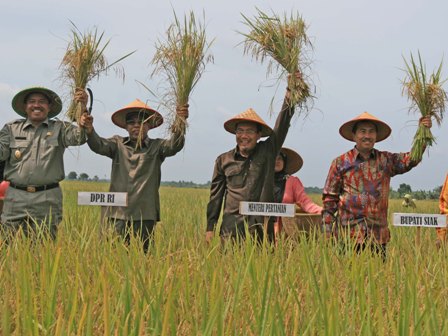Kedaulatan Pangan, Prabowo Janjikan Cetak Sawah Baru
Prabowo Comitted to Developing Food Sovereignty
Reporter : Rizki Saleh
Editor : Cahyani Harzi
Translator : Dhelia Gani

Jakarta (B2B) - Prabowo Subianto sebagai calon presiden menyatakan komitmennya untuk membangun kedaulatan pangan nasional, antara lain melalui pembukaan dua juta hektare lahan sawah baru untuk menjamin ketersediaan pangan.
"Program itu sangat realistis untuk dijalankan," kata Syahganda Nainggolan, Direktur Relawan Pemenangan Prabowo-Hatta.
Menurut dia, selain bisa langsung menyerap tenaga kerja dalam jumlah signifikan, program ini berpotensi memberikan multiplier effect guna mewujudkan kedaulatan pangan dan mengembangkan kesejahteraan hidup rakyat.
Syahganda mengatakan gagasan mencetak 2 juta hektare sawah baru, tak lepas dari fakta sekitar 60% rakyat Indonesia yang bekerja dan menggantungkan hidup pada sektor pertanian.
"Meski mayoritas, petani masih hidup sebagai warga negara kelas dua atau bahkan terpinggirkan," katanya.
Hal itu terjadi karena sumber kehidupan para petani kurang diperhatikan, termasuk akses pada modal usaha yang selama ini kerap dinomorduakan, sedangkan kucuran kredit untuk sektor pertanian tidak semenarik pada sektor konsumsi dan properti yang begitu diagungkan pelayanannya oleh perbankan.
Ia mengutip data Bank Indonesia yang menyebutkan kredit untuk sektor pertanian tak lebih 10 persen dari total kredit yang disalurkan dan banyak bank menghindar mengucurkan kredit ke sektor pertanian dengan alasan penuh risiko.
Jakarta (B2B) - Presidential candidate Prabowo Subianto is committed to developing national food sovereignty among others through cultivation of two million hectares of new rice fields to ensure the availability of food.
"The program is quite realistic and can be implement," Syahganda Nainggolan, director of the Volunteer Success Team of the Prabowo-Hatta presidential and vice presidential pair, said here on Monday.
He said in addition to directly providing jobs for a significant number of workers, the program also had the potential to cause a multiplier effect on the effort to realize the countrys food sovereignty and improve peoples welfare.
Syahganda said the idea to cultivate two million hectares of rice fields was not inseparable from the fact that about 60 percent of the countrys working population depended for their livelihoods on the agricultural sector.
"Even though they are the majority of the people, farmers are still considered as second class people or are even being marginalized," Syahganda said.
This could happen because no attention was paid to the lives of farmers, including their access to capital, because so far they were considered as second class people.
He cited Indonesian central bank data, which revealed that credit for the agricultural sector was not more than 10 percent of the total credit provided by banks.
Many banks rejected channeling credit to the agricultural sector as they believed it was risky.















